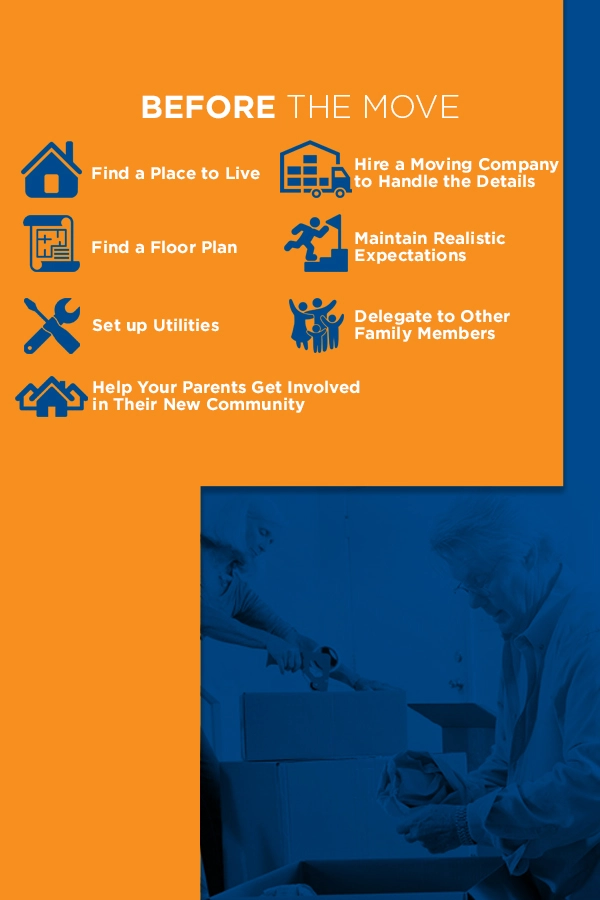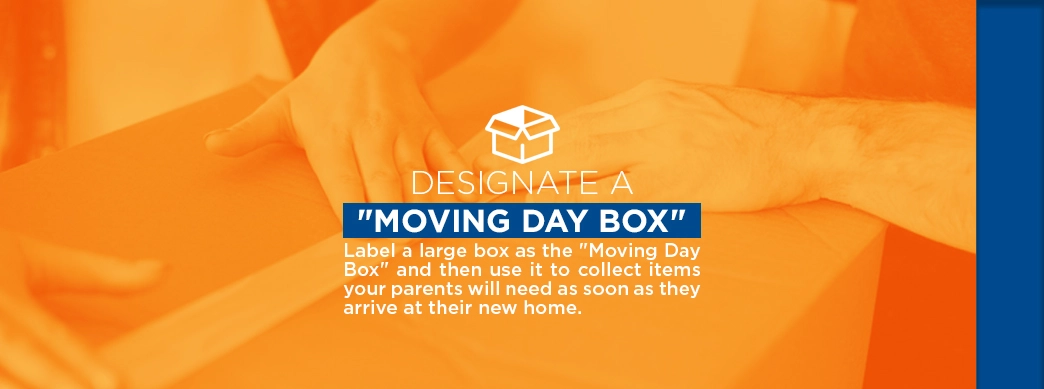
When it comes time to move elderly parents out of their home, there are a million details to take care of. In some cases, you’ve spent months, or even years, contemplating the right timing. In other cases, a fall or illness has prompted a series of quick choices that led to this point. However you arrived at this decision, many elderly parents and their adult children struggle with leaving the family home and transitioning into a new environment. A move like this can be difficult and emotional. But with the proper planning, it doesn’t need to be overwhelming.
The best way to minimize the stress of moving elderly parents is to carefully plan each phase — from selecting a new home and packing to scheduling a visit from the cable guy. Staying organized will help you remain calm and eases the tension of this difficult time. When you’re calm, you can spend time focusing on what’s really important — taking care of mom and dad.
LEARN ABOUT OUR RESIDENTIAL SERVICES
Wondering how to transition your parents to assisted living or help them downsize?
Regardless of where your parents are moving or the circumstances that led them there, there are certain key things you’ll need to do to ensure a successful move. So, grab a pen and a piece of paper, and let’s create a checklist for moving your elderly parents.

Moving parents when downsizing doesn’t have to be complicated if you’ve got a plan. As soon as your parents have decided to sell their home and move elsewhere, it’s time to start planning the move itself. Being strategic about packing and purging old furniture and household items will ease the stress and make it easier to unpack when your parents arrive in their new home.
This step is listed first for a reason. You need to know where your parents will be moving to make decisions about which furniture and possessions will make the trip to their new home. Will they downsize for assisted living? In many cases, elderly adults end up moving out of a three- or four-bedroom house into a two-bedroom apartment. This means there’s a lot of extra furniture that can’t make the trip. If you know up front that you can only move two bedrooms’ worth of furniture into their new home, and you can make plans to sell or give away the remaining furniture.
If your parents are moving to an independent- or assisted-living facility, also make sure you’re clear on whether they’ll be eating with other residents or cooking their own meals. This is critical to know as you’re packing up their kitchen items. If they’ll be eating most of their meals in the facility’s dining room, they likely won’t need a fully-equipped kitchen — nor will they have room for one.
Also, consider location — are they moving across town or across the country? This will determine how much time you’ll need and what kind of assistance you’ll need from a moving company, as well as willing family and friends.
Figuring out where they’ll be living will also help you identify the date for scheduling a move. You’ll need this information before you can continue to step two.
While it may be tempting to handle all of the packing and moving yourself, consider hiring a full-service moving company to handle the process for you. By allowing them to pack your parents’ belongings and transport them to their new home, you will be freed up to help your parents adjust to their new home. Additionally, allowing experienced professionals to handle the grueling physical demands of packing and carrying boxes and heavy furniture can protect you and your parents from injury and fatigue.
We mentioned this already, but it bears repeating — before you call a moving company, make sure you know when you may want to move. Knowing the date or a range of dates up front will help the moving company provide you with their most accurate estimate. If you do have some flexibility on the day, especially if you can move during the week or outside of their peak times, a moving company may be able to offer you a better rate.
When older adults downsize, one of the challenges can be fitting their furniture into a smaller home. Once they’ve found a place to live and all the necessary paperwork has been signed, make sure to obtain a floor plan of their new home. Knowing the layout of the home, as well as the dimensions of the rooms, can help you and your parents plan out how their furniture will fit. There’s nothing worse than getting a heavy wood chest of drawers up three flights of stairs only to realize it won’t fit through the door.
This will also help you figure out what your parents may not have and need to purchase once they get to their new home.
At this stage, many people find it helpful to begin to get rid of the furniture they won’t be taking with them. Consider having a yard sale or estate sale or simply list pieces online.
Before you get any further in the process, stop. Take a deep breath. And remind yourself that your parents are not as young as they used to be. They aren’t going to be able to pack for 12 straight hours without taking a break — nor should they. In some cases, even when parents agree that it’s time to move, the decision is so upsetting to them that they become almost paralyzed with fear and unable to face packing or making decisions. Set realistic expectations for them, as well as yourself. Will you need three months to sort through items and pack? Will it take six months to go through the family home? Are your parents up to the task of sorting and packing or will you need to recruit assistance from other family members?
Speaking of other family members, this is also the time to sit down with your siblings or others who care about your parents and discuss their expectations. Family tensions tend to run high in situations like this, so tread lightly. When parents move, it can impact each child — yes, even adult children — in different ways. Be sure to keep your siblings in the loop on what’s happening and find out if — and how — they want to be included. If your family is all local, then sit everyone down for a heart-to-heart discussion. If everyone is in different places, then schedule a time for a video chat or conference call to discuss what’s happening.
If your parents are making the move into an assisted living facility, inquire about opportunities for them to socialize with other residents before their move — and then follow through! It’s easy to “inquire,” but make a point to actually attend the events you discover. Whether it’s a community meal or social event, these opportunities will allow them to meet their future neighbors and go a long way to ease their minds about the transition. The staff at the assisted living community they’ve chosen can help by making suggestions and keeping you informed about upcoming events.
If they aren’t moving to an assisted living facility but will be transitioning to a new community, do your homework. Is your mother a voracious reader? Check the local library for book clubs or author appearances and go with her to the next available event. Does your father enjoy drinking coffee and catching up with other seniors? Find a YMCA or senior center that’s near his new home and take him to check it out.
Besides keeping your family members informed, it’s critical to ask them to pitch in and help with the process. Many hands do make light work, so the more support you have, the easier the process can be. If you have enough help, consider planning a family packing day or alternate packing days between two or three people so that no one person has to shoulder the load.
If your family members don’t live near your parents, they can still help. Enlist your long-distance sister in calling moving companies for price quotes. Have your tech-savvy brother go online to set up utilities or find points of interest for your parents to visit when they arrive. Just make sure you are clear on what everyone is doing so that you don’t double up on the same tasks.
If your parents are moving into an assisted living facility, then this may not be necessary. However, if they’re moving into a small home, you’ll want to make sure that their water and electricity are turned on before moving day. Also make sure that the appropriate homeowner’s or renter’s insurance policies have been purchased or updated, depending on whether they have bought their new home or will only be renting for a while.

Once you have a plan in place, then it’s time to make things happen. Even if you’ve hired a reputable moving company to handle the packing and moving process, there’s still a lot that you’ll need to do to ensure that the move goes smoothly.
There’s a lot you’ll need to do to prepare the house — and belongings in it — for the arrival of the moving company. Look at the size of the house and then start setting goals. Typically, choosing one room at a time to pack is a good way to get things done without becoming overwhelmed. Then set a timer. Time how long it takes you to clean out drawers, toss old or broken items that you won’t be moving, and then decide which pieces of furniture will be making the move. Once you’re done with that first room, use the amount of time it took as a gauge for how long you’ll need to tackle the other rooms in the house.

Your family home is likely filled with memories and valuables that you’ll want to sort through before moving. If your parents are able, this task should be left to them, since they are the authority on what’s most important. In many cases, elderly parents are unable to face this task or may be physically unable to do so. Talk with your parents to determine how they want to handle this delicate process, and then move forward.
Once you begin, you’ll want to sort items into boxes depending on what your parents want to keep. Once they’ve kept the items that are most meaningful to them, work together to decide what to do with other valuables. Some families divide up the items for keepsakes among children and grandchildren. Other families opt to sell valuables to pay for their parents’ ongoing care in their new home. Some families may decide to do a combination of both.
If you expect to have a lot of antiques or valuables that will be included in the move, it’s even more critical to hire a well-trained, experienced moving company who is committed to protecting the things that are significant to you.

Label a large box as the “Moving Day Box” and then use it to collect items your parents will need as soon as they arrive at their new home. This may include insurance information, signed contracts, toilet paper, a favorite pillow, pajamas and prescription medications they can’t go without.
If you have several family members helping in the weeks leading up to moving day, it can be useful to type up a schedule and give everyone a copy. At the very least, make sure you have a schedule for how things will go on moving day itself. That way everyone knows what time the moving company is arriving, who’s taking your parents to their new home at the end of the day, and who’s picking up the pizza and drinks for lunchtime.
Even though moving is stressful, do your best to stay calm. It’s likely that your parents will already be upset and be looking to you for reassurance. If things get intense, step outside for a few minutes and take a deep breath.

Once all of your parents’ belongings have been moved from their old house to their new one, you’re in the home stretch. But before you close the door on this move, there are a few more details you’ll want to set straight.
Critical utilities like electricity and water should have been set up before the move, but once your parents are in their new home, don’t forget about cable television and phone service if needed. Coordinate a time for these companies to come out to hook up service. Don’t forget to ask up front about installation fees and special deals they may be offering. Moving is expensive — always try to save money when you can.

If your parents have relocated, even if it’s in the same city, you may need to transfer their prescription medications to a pharmacy closer to their new home. This should be done quickly to avoid a lapse in medication.
While you’re doing this, go online and make sure to forward mail from their old home to their new one. Yes, you can update their address with their creditors and other essential services, but it’s inevitable that you’ll forget about forwarding your mom’s favorite magazine or notifying your dad’s cousin before Christmas cards are sent out. The post office offers forwarding services for up to one year after moving, which gives you and your parents plenty of time to contact everyone without missing important mail.
Just as it’s necessary to pack in an organized fashion, it’s also essential to unpack in an organized fashion. Start in the rooms that will be used first, such as the kitchen and master bedroom. Leave rooms like the den or a guest room until later. When you unpack in this manner, it helps you pace yourself and conserve energy. It also means you can use those less-used rooms to store boxes until you’re ready to unpack them.

It’s easy to become so consumed with the details of moving that you forget to take care of your parents. Even once the move itself is over, it will take some time for them to work through their emotions over the move and start to feel settled in their new home. It may be tempting to spend all of your time unpacking boxes and hanging pictures, but it may be more important to stop and have a cup of coffee with your mom or take a walk with your dad. You’ll never regret choosing your parents over unpacking.

If your parents are moving to a different town or community, they may need help locating a new pharmacy, grocery store, auto mechanic and place of worship. If your parents are moving nearer to you, offer them recommendations and take them with you when you run your own errands so they can become familiar with the area. If you can’t be there to help them with this, enlist the support of someone else who can offer them guidance as they transition to their new home. Some people find it useful to get the services of a Senior Move Manager. When you hire a Senior Move Manager, they assist throughout the moving process, including helping manage the trauma that often comes with such a major transition.
If you are not nearby and cannot afford to hire a Senior Move Manager, find someone in the community, such as a pastor or local charitable organization, who can help point them — and you — in the right direction to find the places and services your parents need.
In some cases, your parents may still be handling their own finances. However, if this is no longer the case, the last thing you’ll need to do is make sure you’ve settled up with everyone who’s been involved in the move. If you rented a storage unit, make sure the unit is paid for and then, if possible, set up automatic payments for subsequent months. Make the final payment to the moving company. Ensure that any utility company installation fees have been paid or included in future bills.

Saying goodbye to a home is never easy, but downsizing after decades in the same home can be an emotional and overwhelming process. One of the best ways to ease the stress of this process is to hire a professional moving company. If you are helping elderly parents move, make sure to find a trustworthy and reliable moving company for peace of mind for both you and your family.
Offering packing and moving services in Philadelphia as well as the Mt. Laurel, Cherry Hill and Moorestown areas, Transtar Moving Systems prides itself on being the go-to senior moving company of South Jersey, providing professional full-service moving services for local and long-distance moves. Whether you’re moving your parents to another state or just across town, we offer a variety of moving services designed to help make your job easier.
We know that you are hiring us to protect your valuable possessions, and we don’t take that trust lightly. Our goal is to treat your belongings as if they were our own. We pack and move everything with the utmost care and attention to ensure that your possessions arrive at your new home in the same condition they were when they were loaded onto our truck. We offer competitive pricing and personalized service that is second-to-none.
If you are preparing to help your loved ones make the transition to a smaller home, we welcome the chance to help ease the burden and walk through the process with you. Request a free comprehensive quote online or call us today at 855-720-7833 for more information.